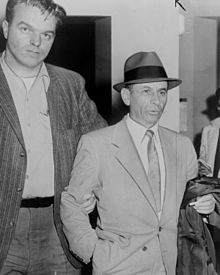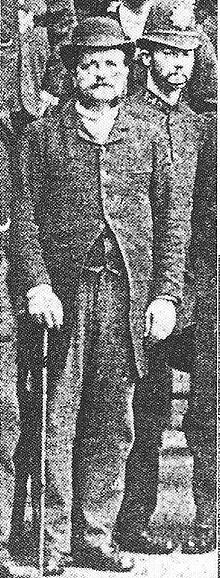- Detective
-
For other uses, see Detective (disambiguation).
A detective is an investigator, either a member of a police agency or a private person. The latter may be known as private investigators or "private eyes". Informally, and primarily in fiction, a detective is any licensed or unlicensed person who solves crimes, including historical crimes, or looks into records.
Contents
Overview
In some police departments, a detective position is not appointed, it is a position achieved by passing a written test after a person completes the requirements for being a police officer.[citation needed] Prospective British police detectives must have completed at least two years as a uniformed officer before applying to join the Criminal Investigation Department. UK Police must also pass the National Investigators' Examination in order to progress on to subsequent stages of the Initial Crime Investigators Development Programme in order to qualify as a Detective.[1]
In many other police systems, detectives are college graduates who join directly from civilian life without first serving as uniformed officers.[citation needed] Some people[who?] argue that detectives do a completely different job and therefore require completely different training, qualifications, qualities and abilities than uniformed officers. The opposing argument is that without previous service as a uniformed patrol officer, a detective cannot have a great enough command of standard police procedures and problems and will find it difficult to work with uniformed colleagues.
Detectives obtain their position by competitive examination covering such subjects as principles, practices and procedures of investigation; interviewing and interrogation; criminal law and procedures, applicable law governing arrests, search and seizures, warrants and evidence; police department records and reports; principles, practices and objectives of courtroom testimony; and police department methods and procedures; typically both officers and detectives do interrogation, but detectives deal with more sensitive situations.[citation needed]
Private detectives are licensed by the state in which they live after passing a competitive examination and a criminal background check. Some states require a period of classroom training and must have experience with a weapon as well.[citation needed]
Organization
The detective branch in most large police agencies is organized into several squads or departments, each of which specializes in investigation into a particular type of crime or a particular type of undercover operation, which may include: homicide; robbery; burglary; auto theft; organized crimes; missing persons; juvenile crime; fraud; narcotics; vice; criminal intelligence; aggravated assault/battery; sexual assault; computer crime; domestic violence; surveillance; and arson, among others.
Where 'detective' is a title preceding someone's name, it is abbreviated Det.
Techniques
Street work
Detectives have a wide variety of techniques available in conducting investigations. However, the majority of cases are solved by the interrogation of suspects and the interviewing of witnesses, which takes time. Besides interrogations, detectives may rely on a network of informants they have cultivated over the years. Informants often have connections with persons a detective would not be able to approach formally. Evidence collection and preservation can also help in identifying a potential suspect(s).
Criminal investigation: the investigation of criminal activity is conducted by the police. Criminal activity can relate to road use such as speeding, drunk driving, or to matters such as theft, assault, fraud, etc. When the Police have concluded their investigation a decision on whether to charge somebody with a criminal offence will often be made by prosecuting counsel having considered the evidence produced by the Police.
In criminal investigations, once a detective has suspects in mind, the next step is to produce evidence that will stand up in a court of law. The best way is to obtain a confession from the suspect; usually, this is done by developing rapport and at times by seeking information in exchange for potential perks available through the Attorney's Office, such as entering for a lesser sentence in exchange for usable information. Detectives may lie, mislead and psychologically pressure a suspect into an admission or confession as long as they do this within procedural boundaries and without the threat of violence or promises outside their control.
Forensic evidence
Physical forensic evidence in an investigation may provide leads to closing a case. Forensic science (often shortened to forensics) is the application of a broad spectrum of sciences to answer questions of interest to the legal system. This may be in relation to a crime or to a civil action. Many major police stations in a city, county, or state, maintain their own forensic laboratories.
Records investigation
Detectives may use public and private records to provide background information on a subject. Police detectives can search through files of fingerprint records. Police maintain records of people who have committed felonies and some misdemeanors. Detectives may search through records of criminal arrests and convictions, photographs or mug shots, of persons arrested, and motor vehicle records.
With a warrant, police detectives can also search through credit card records and bank statements, hotel registration information, credit reports, answer machine messages, and phone conversations.
See also
References
Categories:- Detectives and criminal investigators
- Criminal investigation
- Police ranks
Wikimedia Foundation. 2010.


